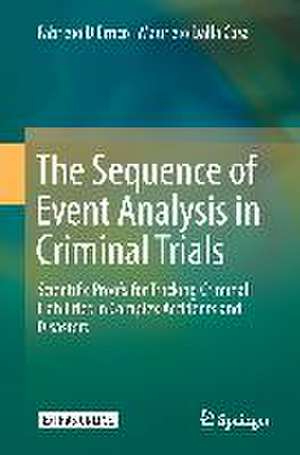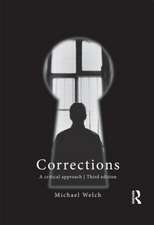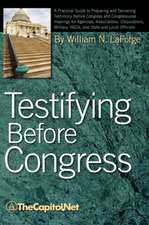The Sequence of Event Analysis in Criminal Trials: Scientific Proofs for Tracking Criminal Liabilities in Complex Accidents and Disasters
Autor Fabrizio D’Errico, Maurizio Dalla Casaen Limba Engleză Hardback – 22 aug 2015
| Toate formatele și edițiile | Preț | Express |
|---|---|---|
| Paperback (1) | 379.48 lei 6-8 săpt. | |
| Springer Berlin, Heidelberg – 22 oct 2016 | 379.48 lei 6-8 săpt. | |
| Hardback (1) | 386.61 lei 6-8 săpt. | |
| Springer Berlin, Heidelberg – 22 aug 2015 | 386.61 lei 6-8 săpt. |
Preț: 386.61 lei
Nou
Puncte Express: 580
Preț estimativ în valută:
73.97€ • 77.24$ • 61.09£
73.97€ • 77.24$ • 61.09£
Carte tipărită la comandă
Livrare economică 15-29 aprilie
Preluare comenzi: 021 569.72.76
Specificații
ISBN-13: 9783662478974
ISBN-10: 3662478978
Pagini: 150
Ilustrații: XIII, 127 p. 20 illus., 9 illus. in color.
Dimensiuni: 155 x 235 x 14 mm
Greutate: 0.38 kg
Ediția:1st ed. 2016
Editura: Springer Berlin, Heidelberg
Colecția Springer
Locul publicării:Berlin, Heidelberg, Germany
ISBN-10: 3662478978
Pagini: 150
Ilustrații: XIII, 127 p. 20 illus., 9 illus. in color.
Dimensiuni: 155 x 235 x 14 mm
Greutate: 0.38 kg
Ediția:1st ed. 2016
Editura: Springer Berlin, Heidelberg
Colecția Springer
Locul publicării:Berlin, Heidelberg, Germany
Public țintă
Professional/practitionerCuprins
Part I: On Judicial and Evidential Reasoning in the Field of Industrial Accidents: 1. On Judicial and Evidential Reasoning in the Field of Industrial Accidents.- 2. An Introduction to Judicial Reasoning in Large Scale Industrial Accidents and Disasters.- 3. Causation by Scientific Laws.- 4. First Level of Sequence of Event Analysis.- Part II: From Scientific Proofs to Reconstruction of Multi-level Liability Pattern in Organization: 5. The Analysis of Accidents Using a Multi-level Approach: Organizational Accidents.- 6. Multi-level SEA Analysis for Tracing Criminal Responsibility in Organizational Accidents.- 7. The Sequence of Events Assisted by Computer Graphics: Two Case Studies.
Textul de pe ultima copertă
This book presents a general method that lawyers, prosecutors and judges can follows to assess the quality and scientific content of technical work done for an accident and crime scene reconstruction. Using multilevel sequence of events analysis allows all key events to be fully identified, which in turn assists judicial bodies in identifying where to assign specific criminal liability. Created from a concept long sought by the two authors (an engineer and an attorney), the method allows readers without any technical background to progress from an examination of evidence gathered at the scene of a complex accident and to reconstruct "beyond reasonable doubt" the events that took place. Once created and scientifically verified by the sequence of events analysis, the chain of key events serves as a reference source for various levels of complex organizations and inter-organization structures in cases involving complex criminal responsibilities.
Caracteristici
Explains and demonstrates how evidential reasoning can be used to track criminal liability in the context of complex accidents Introduces powerful and user-friendly key steps for identifying causal links between damaging events and the conduct of specific subjects Supports professionals and government bodies that study complex accident that sometimes develop into civil disasters Provides an authoritative method for prosecutors and judges to assess the reconstruction of complex accidents (be they civil air or rail transport or industrial manufacturing facilities, etc) that involve complex systems as a first step in identifying the correct profiles of responsibility Puts into practice the fundamentals described step-by-step throughout the book Describes real cases with two different levels of complexity The book’s website helps readers to learn how to apply sequence of events analysis to 3D dynamic crime scene reconstructions A common-language tool is created for exchanging information between technical experts and lawyers











